We invite you to meet some of our alumni, now working in industry and academia.
Read more about their research and experiences at UC Merced and how it has translated into their work today.
If you would like to see a full listing of EECS alumni, click here.
_______________________________________
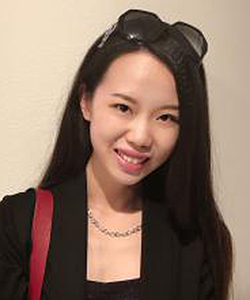 Sifei Liu
Sifei Liu
2012 - 2017
Ph.D. awarded 2017
Advisor: Ming Hsuan-Yang
UC Merced alumna Sifei Liu, who earned a Ph.D. in Electrical Engineering and Computer Science in 2017, was selected to participate in Rising Stars in Electrical Engineering and Computer Sciences 2019. Rising Stars is an intensive workshop for women graduate students and post-doctoral scholars who are interested in pursuing academic careers in computer science, computer engineering and electrical engineering.
Liu is a senior research scientist at NVIDIA Research, Learning and Perception (LPR) in Santa Clara. She conducts research on computer vision and machine learning to benefit the company's products and find advanced techniques.
She was nominated by her faculty advisor, Professor Ming-Hsuan Yang, for her research excellence and potential to excel in an academic career.
During her graduate studies, Liu worked on “compressed face hallucination” with a focus on editing images via image-processing and optimization techniques. After her first publication on this topic, she moved on to “fancy face editing” and quickly learned that “face parsing” — the act of preserving facial identity features — is the core to her tasks. However, she found few reliable methods, so she developed her own.
“I slightly shifted my focus to face parsing using deep learning and developed the state-of-the-art face parsing algorithm via a pairwise learning module — when deep learning was still only beginning to emerge in top conferences,” she said.
Liu earned an M.C.S. from the University of Science and Technology of China, Department of Electrical and Computer Engineering, and received a bachelor’s degree in control science from North China Electric Power University.
“I’m grateful for the knowledge that I gained from UC Merced,” she said. “I am also fortunate to maintain collaborations with current Ph.D. students at UC Merced.”
_______________________________________
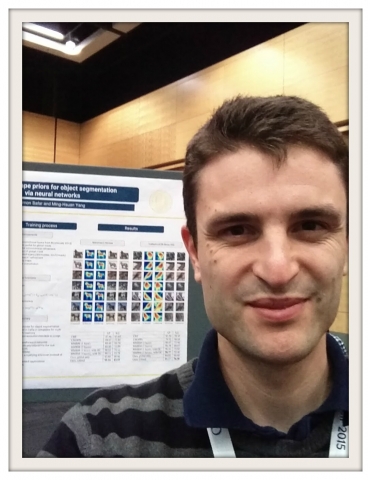 Simon Sáfár
Simon Sáfár
2012 - 2014
M.S. awarded 2014
Advisor: Ming Hsuan-Yang
Simon came to Merced in 2012, attracted by his interest in our faculty research areas and the relative proximity of Silicon Valley.
The size of our program mattered quite a lot to Simon when he was picking his master's program, and his choice really paid off for him. "Because our group was still small, I got to talk to my advisor often," he said. "And yet we still had a number of established grad students who had been here for a while and were already publishing papers at top international conferences. It set a great example."
Simon's master's work was on various areas of computer vision. He notes that he had a lot of freedom to pick his research topic, as the EECS group was working on a wide range of topics surrounding computer vision. One of Simon's research problems was determining which specific parts of an image belonged to the main subject of that image, and which specific parts belonged to the background — something that is more complex than it sounds.
"Having a cluttered background made this problem even harder," Simon said. "For example, if we were working on an image of birds — imagine twig-colored birds hiding in front of lots of twigs. But, as a solution, we were able to learn the possible shapes and colors of birds from example images, so that our method performed better on subsequent pictures."
During his time at UC Merced, Simon learn most everything he knows about practical computer vision, and he also developed a practical skillset including how to do autonomous and efficient research.
Now, Simon works for Google on Mountain View. His team developed the new intelligent burst mode for the camera app on the 2015 Nexus phones. Of his work, Simon said, "It's just the right mix of theoretical computer vision problems ("how do we tell which photos users will like best?"), practical ones ("how do we make it run on a phone at 30 FPS?") and software engineering ("how do I add this feature to this huge code base while keeping it comprehensible?")." He's very happy with the company, too: "Google has a cool, open culture and the nicest code I've ever seen."
___________________________________________________
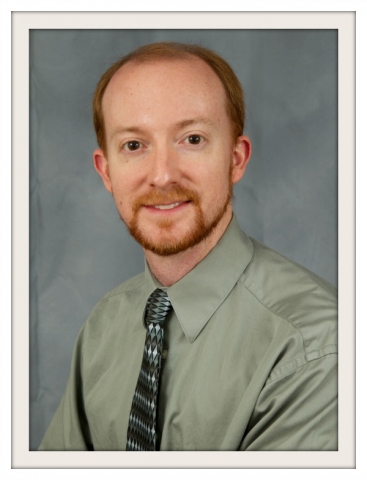 Joshua L. Phillips, Ph.D.
Joshua L. Phillips, Ph.D.
2006 - 2012
Ph.D. awarded 2012
Advisors: Shawn Newsam and Michael Colvin
Josh came to UC Merced for his Ph.D. work because the EECS group had faculty doing research in areas that he found exciting. "My advisors were very proactive about my professional development, and sought out opportunities for me that I would have never have pursued without their support," he said. "They were committed to my success, and that made me appreciate being a part of the program. Good advising makes all the difference for a Ph.D. student, and UC Merced has some great faculty!"
For his doctoral research, Josh used computational simulations and machine learning to study the function of FG-nucleoporins: proteins which fill the center of the nuclear pore complex and are responsible for transporting large molecules in and out of the cellular nucleus.
This work helped his group to propose a new model of how the nuclear pore complex works (i.e. the Forest Model), and some specific predictions of that model were later validated in experiments by other researchers. The FG-nucleoporins were also good representatives of the protein family to which they belong (intrinsically disordered proteins), so he utilized simple polymer models to validate machine learning methods used to summarize the dynamical features of this family. The software tools that were developed as part of this project made computational clustering and dimensionality estimation for large simulations (~1M - 10M frames) feasible on common desktop machines.
After receiving his Ph.D. in 2012, Josh held a postdoctoral researcher position at postdoctoral work at Los Alamos National Laboratory (LANL), before moving to a tenure-track professorship at Middle Tennessee State University (MTSU). At MTSU, he teaches upper division and graduate classes and works with Ph.D., M.S. and B.S. students on various research projects. His research is in computational structural biology with applications to HIV vaccine design, antibiotic resistance, biofuels production, and toxin neutralization.
Josh's experiences at UC Merced prepared him for his position at MTSU in ways that went beyond the typical computational and research skills. "My advisors made sure to encourage me to give seminars whenever possible, and I kept doing that throughout my postdoctoral work at Los Alamos National Laboratory (LANL) and my time at MTSU," he said. "These experiences help me find opportunities for funding and collaboration that would elude me otherwise (including the postdoctral fellowship I held while at LANL)." Josh was also able to participate in grant development and writing at UC Merced, which helped him prepare for writing grants in his current position.
More unexpectedly, Josh's time at UC Merced prepared him for the experience of building a solid program from the ground up. "I was able to see UC Merced in it's first few years of existence, and I learned to have some patience as things get ironed out, but also how exciting it can be when things start coming together," he said. "The Computational Science PhD (COMS) program here at MTSU is still relatively new — it started in 2009 — so I've been able to bring that experience to MTSU which has allowed me to take on critical roles in the development of the COMS program."
Today, Dr. Phillips trains his students in the same computational skills that he picked up at UC Merced and during his postdoctoral work at LANL. He still works with collaborators at LANL and is able to help his students get to know the lab just like his advisors helped him. "It has been a very rewarding experience for both myself and my students!"
___________________________________________________
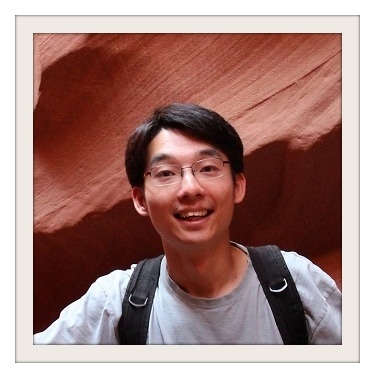 David Huang, Ph.D.
David Huang, Ph.D.
2007 - 2012
Ph.D. awarded 2012
Advisor: Marcelo Kallmann
David joined the EECS group in 2007 as a doctoral student to professor Marcelo Kallmann.
David chose UC Merced for his doctoral studies because of our excellent faculty and funding record. He was also attracted by EECS's small group size, which meant that he had more access to shared resources — in his case, an advanced motion capture system, a Powerwall and a small humanoid robot — a significant advantage over the experience he might have in other programs. "I also had the opportunity to easily collaborate with other groups on interdisciplinary research — Professor Teenie Matlock from the School of Social Sciences, Humanities and Arts," he said.
While at UC Merced, David's research focused on virtual humans, specifically on real-time motion synthesis and motion planning for virtual humans. He also did some work on human-computer interaction and robotics.
Now, David is the Lead Research & Development Engineer at EON Reality. Some of his projects include American football and baseball training applications, an immersive dome theater, and other interactive virtual reality platforms.
Many of the skills David gained at UC Merced are crucial to his current work, including his experience working on large scale virtual reality systems such as the Powerwall, as well as his experience with character animation, a motion capture system, computer graphics libraries and engines.
___________________________________________________
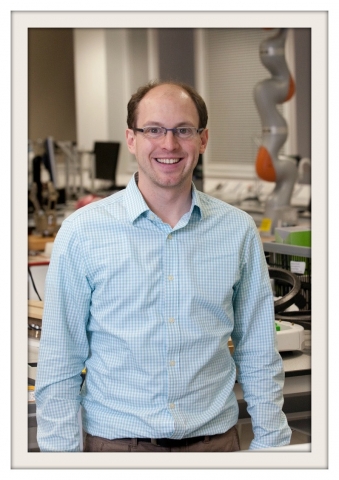
Andreas Kolling, Ph.D.
2007 - 2009
Ph.D. awarded 2009
Advisor: Stefano Carpin
Andreas joined the EECS group at UC Merced in 2007 as a student of Dr. Stefano Carpin.
Andreas' areas of expertise include planning for multi-robot systems, pursuit-evasion, graph theory, cooperative robotics, machine learning, and human-robot interaction. His primary research interest is the development of large-scale multi-robot systems with an emphasis on search problems. He has contributed system designs, novel theorectical results and algorithms, as well as built prototype systems for large-scale search with humans, unmanned ground, and aerial vehicles. He has authored more than 50 publications in these areas.
Upon completing his Ph.D. at UC Merced, Andreas accepted the position of Lecturer (the UK equivalent of an Assistant Professor) at the Department of Automatic Control and Systems Engineer at The University of Sheffield in the United Kingdom.
His work at the University of Sheffield included administration, teaching, research, supervision of Ph.D. and other student projects, grant writing, paper writing, conferences, reviewing papers, serving on committees, and outreach.
In June 2016, Dr. Kolling left the University of Sheffield to take a position at iRobot in Pasadena, California.



